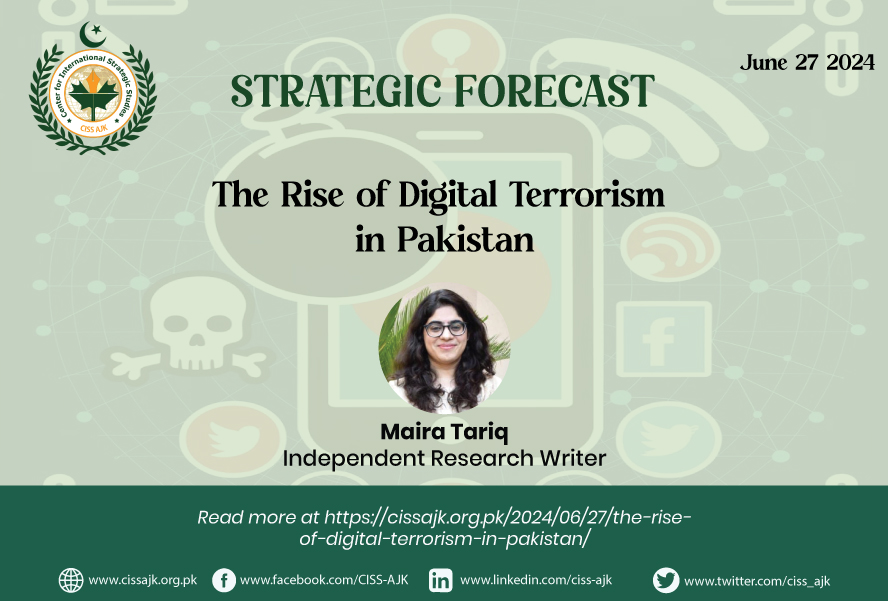In this interconnected world, technology encompass every aspect of life. Pakistan stands at the crossroads of security challenges and digital innovation. While growing advancements in Artificial Intelligence (AI) propose new opportunities for development and growth of Pakistan. Despite this, Pakistan finds itself dealing with a growing threat of digital terrorism. This modern form of terrorism takes advantage of the same tools that connect us to propagate conflict, incite violence, and spread fear in the country. Addressing this double-edged weapon compels a comprehensive approach combining strong cyber-security measures, public awareness, ethical AI practices, and international cooperation.
Digital terrorism covers a range of malicious activities, such as spreading extremist propaganda, cyber espionage, disrupting critical infrastructure, and hacking. However, the complex socio-political landscape, the rapid expansion of internet access and the continued terrorist attacks in Pakistan are increasing the threat of digital terrorism. Terrorist organizations take advantage from digital platforms to hire new members, influence young people with extreme ideologies, organize attacks and spread propaganda among people.
Social media platforms have become breeding grounds for extremist ideologies. Terrorist groups use the privacy of these platforms to target specific populations with religious propaganda. This digital radicalization process is vast and grows rapidly with each passing day. However, it is difficult for authorities to prevent and counter these acts.
Several instances further illustrate how dangerous digital terrorism has become in this era of Artificial Intelligence (AI). One of the most significant examples of digital terrorism occurred in 2013 & 2014 when Pakistan was hit hard by a major cyber espionage attack . A sophisticated team of hackers, believed to be backed by a state, sent out spear-phishing emails to obtain sensitive information from military networks. The emails contained malicious files and links designed to infiltrate classified military websites. Once inside the networks, the hackers deployed malicious software to extract key secrets, such as strategic plans, communications, and personnel information. The breach was discovered when unusual web activity was detected, prompting cyber teams to investigate. This incident underscored the need for Pakistan’s military to implement robust cyber-security measures and advanced threat detection strategies to prevent future breaches and protect national security.
Another significant incident occurred in 2018 when Pakistan experienced a major cyber-attack that compromised the entire banking sector, exposing the personal data of thousands of customers. The hackers used phishing emails to infiltrate the networks and deploy malware that collected sensitive data, including customer account information and transaction details. Consequently, numerous illegal transactions occurred, causing substantial financial losses for customers. This incident highlighted the vulnerability of Pakistan’s financial institutions to digital terrorism and emphasized the need for improved cyber-security measures.
Moreover, terrorist groups in Pakistan have been using social media and other online platforms to recruit individuals. The non-state actors use encrypted messaging apps and social media platforms to spread radical ideas and organize attacks. The group exploited AI-driven algorithms to target and identify susceptible individuals, spreading propaganda and inciting violence. They started online campaigns utilized fake videos to create realistic-looking content designed to attract young people, spreading falsehoods that fueled violence and terrorism. The group’s use of AI technology enabled them to reach a larger audience while evading detection by authorities.
Several factors can gradually become significant problems in countering AI-driven digital terrorism, notably the relatively weak cyber-security situation in Pakistan. Many executives have expressed concerns that numerous organizations, including government entities, are ill-prepared to handle these advanced attacks enabled by AI integration. This situation is exacerbated by the scarcity of skilled cyber-security personnel, leaving many critical systems vulnerable to exploitation.
Furthermore, there is a lack of sufficient legal and regulatory infrastructure to effectively govern AI’s technological development in Pakistan. Current laws are uniformly insufficient to address the contingencies of AI in cyber-criminality. The slow pace of updating and enforcing these laws demoralizes campaigns against the emerging menace of digital terrorism. Another crucial factor is the public awareness. A considerable number of internet users in Pakistan remain unaware of AI’s role in digital terrorism. This ignorance makes the world more susceptible to malicious individuals who efficiently coordinate their ill intentions.
Consequently, while AI technology is recognized as a strong asset, it also constitutes a new threat in combating digital terrorism. To address this threat, it is necessary to combine global efforts by utilizing advanced technologies, increasing public awareness, adopting proper legislation, and fostering international cooperation. Pakistan can safeguard its citizens from these malicious acts by following the right strategies and ensuring they are equipped with the necessary tools and knowledge. Therefore, approaches to preventing the exploitation of the digital world for malicious purposes must adapt, while the benefits of AI technology for overall well-being should be comprehensively embraced.
Author
Maira Tariq holds MPhil degree in International Relations. She is an independent research writer.

